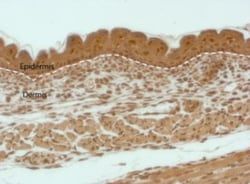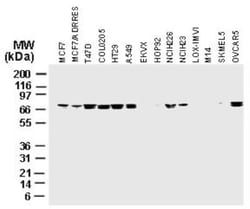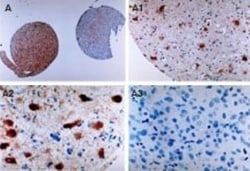Caspase-14 Antibody, Novus Biologicals™
Manufacturer: Fischer Scientific
Select a Size
| Pack Size | SKU | Availability | Price |
|---|---|---|---|
| Each of 1 | NB10056126-Each-of-1 | In Stock | ₹ 31,461.50 |
NB10056126 - Each of 1
In Stock
Quantity
1
Base Price: ₹ 31,461.50
GST (18%): ₹ 5,663.07
Total Price: ₹ 37,124.57
Antigen
Caspase-14
Classification
Polyclonal
Dilution
Western Blot 1:1000-1:2000, Immunohistochemistry, Immunoprecipitation 1:50-1:200, Immunohistochemistry-Paraffin 1:1000-1:5000
Gene Accession No.
NP_033939
Gene Symbols
CASP14
Immunogen
Recombinant full-length human Caspase-14 was used as immunogen.
Quantity
0.05 mL
Research Discipline
Apoptosis, Cancer, Caspases
Gene ID (Entrez)
23581
Target Species
Human, Mouse, Rat, Canine, Gerbil
Form
Antisera
Applications
Western Blot, Immunohistochemistry, Immunoprecipitation, Immunohistochemistry (Paraffin)
Conjugate
Unconjugated
Formulation
Neat whole antisera with 0.02% Sodium Azide
Gene Alias
apoptosis-related cysteine protease, CASP-14, caspase 14, apoptosis-related cysteine peptidase, caspase 14, apoptosis-related cysteine protease, caspase-14, EC 3.4.22.-, MGC119078, MGC119079, MICE
Host Species
Rabbit
Purification Method
Unpurified
Regulatory Status
RUO
Primary or Secondary
Primary
Test Specificity
This polyclonal antibody recognizes the proform of caspase-14 (∼-28-32 kDa), and the large (∼14-21 kDa) and small (∼10-11 kDa) of active/cleaved caspase-14.
Content And Storage
Store at 4C short term. Aliquot and store at -20C long term. Avoid freeze-thaw cycles.
Isotype
IgG
Description
- Caspase-14 Polyclonal specifically detects Caspase-14 in Human, Mouse, Rat, Canine, Gerbil samples
- It is validated for Western Blot, Immunohistochemistry, Immunoprecipitation, Immunohistochemistry-Paraffin.


